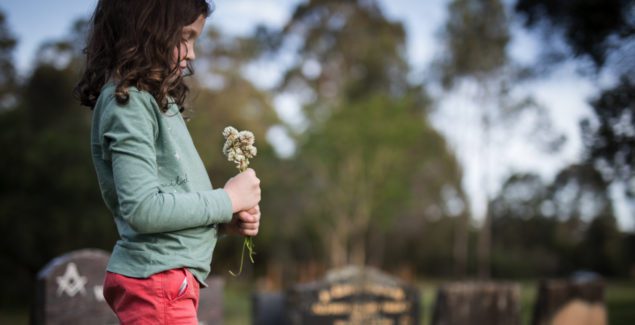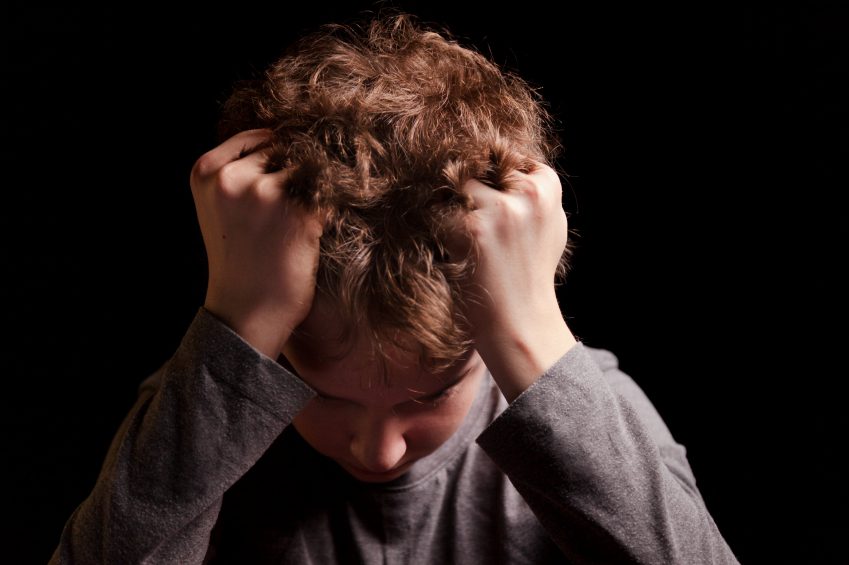Death of a Loved One: How Do I Help My Child Cope?

Posted in: Grade School, You & Your Family, Young Adults
Topics: Child + Adolescent Development, Stress
When a family member dies, it can be one of the hardest times to manage. That pretty much goes without saying. Still, how does one begin an article about the death of a loved one with anything but the painfully obvious? In a world of medical miracles and increasingly prolonged lives, we have understandably become decreasingly comfortable with the one sure thing that we all share – that is, that we are all mortal.
Lofty word, to be sure.
Deaths of loved ones are usually discussed in this way. And this, of course, is part of the difficulty facing children and adolescents who must get through these difficult times. Kids hear grownups talk of death in terms that transcend and bypass their developmental needs. In this piece, we’ll try to break it down so that you can feel more comfortable talking about some of the most challenging topics of life with young people. We will limit this discussion to the death of a parent, but know that the developmental principles hold true no matter who has passed away, if the person who has died holds meaning for the child. You can also read more on ways to support a young person in coping with grief and loss during COVID-19 here.
The Death of a Parent
The death of a parent is particularly difficult. For children and adolescents, feelings of guilt and grief complicate the normal developmental tasks of separation and autonomy. In other words, the completely expected, typical process of becoming independent of one’s parents is short-circuited by the drastic changes that an untimely death creates. There is no going and coming back, as there is with a stubborn teen. The discomfort and awkwardness that young people experience often leave them feeling lonely and unsure of how peers and adults expect them to respond to their loss.
Following the death of a loved one, most people tend to show some of the symptoms of clinical depression. Kids may have a hard time sleeping, they may lose their appetite, or they might eschew time with friends and previously enjoyed activities. These are of course generalizations; some children will appear remarkably OK despite the recent loss, but most will have some kind of noticeable emotional difficulty. There is an ongoing controversy about what constitutes “normal grieving,” and where this grieving becomes “depression.” In these circumstances, it is best to think in terms of functioning. A child only has a limited time to grow up; if the loss of a parent threatens that growth for longer than a week or two, that child is in need of extra attention. Additionally, as our society becomes more culturally diverse, some families may respond to the loss of a loved one in unfamiliar ways. If you are wondering about the death of someone outside of your family, be aware that all cultures have designated rituals intended to foster community support for those who are suffering loss. Ask how you can help the family to properly observe the passing of a loved one.
Developmental and Circumstantial Differences
Children and adolescents differ in their response to the death of a parent as a function of both their own development, and of the circumstances by which the parent died. Losing a parent suddenly to an automobile accident, for example, is different than losing a parent to a long illness like cancer. What follows is an overview of these differences.
Younger Children
In stressful times, people tend to regress. They may seem younger than they actually are. Normally, children take pride in their sense of mastery over daily tasks—such as waiting for the bus, walking to school, and actively participating in their learning—and they are beginning to trust that adults other than parents can provide safety and comfort. Their cognitive capacity is growing to include such concepts as “cause and effect,” and to recognize differences between reality and fantasy.
However, when a parent dies or becomes gravely ill, younger children might revert to a more magical and immature view of the world. They may overtly express concerns that their own past transgressions caused a parent’s death, or they may feel guilty about expressing anger, or acting out before the parent died. During school, younger students may suffer a host of difficulties. They can become preoccupied with fears of separation from other caregivers, or morbid fears of illness; they can experience an increase in physical complaints, or endure more difficulty focusing on learning. Many children will intellectually understand that they are not to blame, but they may find it difficult to dismiss these feelings altogether, and even feel ashamed of the regressed nature of their worries.
While you shouldn’t force a child to talk, you can encourage discussion. You might say “I know this is tough—let me know when you want to talk, or if you have questions.” Keep the door open, but don’t force it open (at least at first). Children process these events at their own rate.
Adolescents
As students mature, their growing capacity for complex cognitive and emotional reaction changes. Although older children may understand that they are not to blame for a parent’s death, they may feel remorse about comments made to a parent during their typical adolescent struggles to separate from family control. For deaths that occurred suddenly, adolescents may feel sad that they were not able to say goodbye, or apologize for past arguments and misbehavior. Clinicians have observed that adolescents who face the death of a parent sometimes become more argumentative at school and at home, and may demonstrate decreased judgment through substance abuse and other reckless behavior.
Older children often report that they feel unsure of how adults expect them to respond. Adults may be put off by the teen who seems more concerned about a date to the prom or an athletic event than by the death of a parent. Such teen behavior often reflects the normal egocentrism characteristic of adolescence, and does not necessarily indicate that the adolescent is failing to feel or cope with difficult emotions.
Students who persistently function poorly require intervention at home and at school. Because schools must balance understanding a student’s difficulties with the demands of curriculum and learning, any student who is unable to reasonably keep up with his or her work may benefit from a referral to mental health clinicians inside or outside of school. In most instances, teachers, school officials, families and counselors can best design an individual academic plan specific to the suffering student.
Recognize The Challenges
Our growing capacity to treat devastating illness contrasts often sharply with our increasing discomfort with death. When a child loses a parent, however, even physicians may feel overwhelmed by sadness and uneasiness. Parents are themselves grieving, and the time is critical for a family. The best remedy is therefore open support from family and friends. Don’t be afraid to ask for help, and don’t be afraid of your child’s questions. Rituals that are personalized can help a great deal. Some families may choose to celebrate the deceased parent’s birthday. Some might visit the grave with regularity. Being open to different ways of coping, and being vigilant for ongoing difficulties in maintaining a developmental trajectory, are essential to negotiate these difficult times.
For further information, advice and support, please visit:
- The National Alliance for Children’s Grief (NACG)
- The Dougy Center, The National Center for Grieving Children & Families
- GriefNet.org
- KidsHealth.org


 Share
Share Tweet
Tweet





